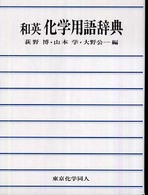- ホーム
- > 洋書
- > 英文書
- > Science / Mathematics
Full Description
the demise of the logical positivism programme. The answers given to these qu- tions have deepened the already existing gap between philosophy and the history and practice of science. While the positivists argued for a spontaneous, steady and continuous growth of scientific knowledge the post-positivists make a strong case for a fundamental discontinuity in the development of science which can only be explained by extrascientific factors. The political, social and cultural environment, the argument goes on, determine both the questions and the terms in which they should be answered. Accordingly, the sociological and historical interpretation - volves in fact two kinds of discontinuity which are closely related: the discontinuity of science as such and the discontinuity of the more inclusive political and social context of its development. More precisely it explains the discontinuity of the former by the discontinuity of the latter subordinating in effect the history of science to the wider political and social history. The underlying idea is that each historical and - cial context generates scientific and philosophical questions of its own. From this point of view the question surrounding the nature of knowledge and its development are entirely new topics typical of the twentieth-century social context reflecting both the level and the scale of the development of science.
Contents
Introduction: The Major Breakthrough in Scientific Pratice.- Introduction: The Major Breakthrough in Scientific Pratice.- Epistemology and Philosophy of Science.- Ibn S?:n?'s Philosophy of Mathematics.- Avicenna on Self-Awareness and Knowing that One Knows.- A Conceptual Analysis of Early Arabic Algebra.- Avicenna's Naturalized Epistemology and Scientific Method*.- The Philosophy of Mathematics.- The Birth of Scientific Controversies The Dynamics of the Arabic Tradition and Its Impact on the Development of Science: Ibn al-Haytham's Challenge of Ptolemy's Almagest.- Logic Philosophy and Grammar.- Jiha/Tropos-M?dda/H?l? Distinction in Arabic Logic and its Significance for Avicenna's Modals.- Islamic Logic?.- Logical Fragments in Ibn Khald?n's Muqaddimah.- Avicenna on the Quantification of the Predicate (with an Appendix on [Ibn Zur?a]).- Name (ism), Derived Name (ism mushtaqq) and Description (wa?f) in Arabic Grammar, Muslim Dialectical Theology and Arabic Logic.- Logic and Metaphysics in Avicenna's Modal Syllogistic.








